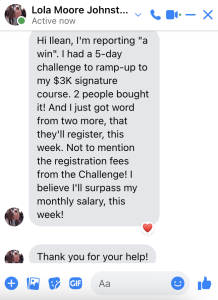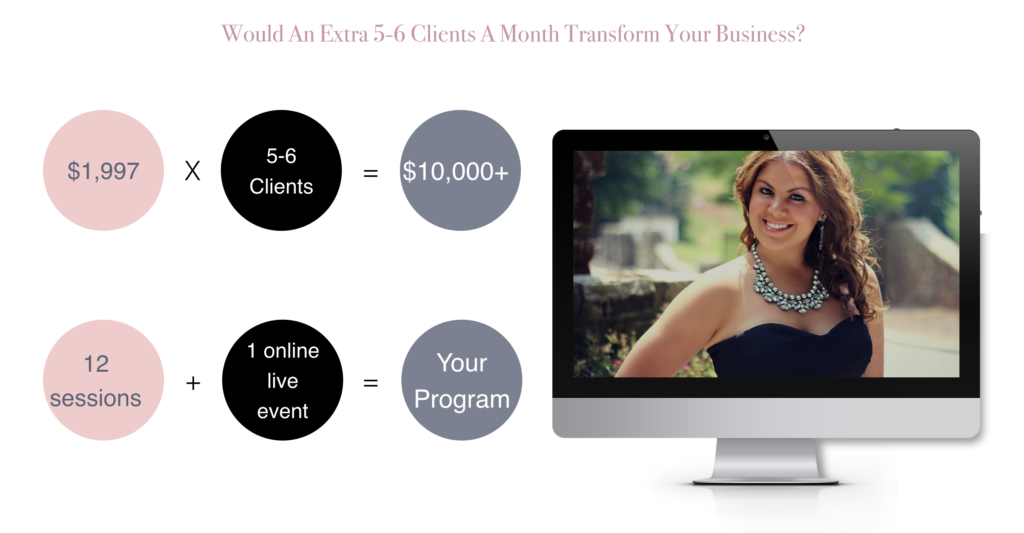This post is all about how to start a coaching business.

Starting a coaching business can be a fulfilling and lucrative career choice for those with a passion for helping others.
But sometimes you encounter some bumps in the road that distract your from your true calling and from helping others.
Have you ever had any of these challenges:
- The idea of having a sales conversation freaks you out
- Find it impossible to get your ideal clients who you actually enjoy working with
- You are attracting broke people consistently
- You are barely able to stay in business due to a lack of clients or really low prices that do not Reflect your worth
- Trouble with time management (learning vs earning in your business)
- You are frustrated and angry
- You are convinced you are not good at sales or even coaching
I’m going to teach how to easily crush it in your business so that these challenges no longer hold you back.
After working with coaching clients in over 20 countries and growing my database to over 100,000 email subscribers, I can show you how to do the same!

However, the prospect of starting a business from scratch can be overwhelming.
The coaching industry is a great field to work in for several reasons:
- Personal satisfaction: Coaching is a rewarding profession that allows you to help others achieve their goals and improve their lives. It’s a fulfilling experience to see your clients succeed and make progress in their personal or professional lives.
- Flexibility: Coaching is a flexible profession that allows you to work from anywhere and set your own schedule. This makes it an ideal career for those who want to have control over their work-life balance.
- High earning potential: As a coach, you have the opportunity to earn a high income, especially if you specialize in a niche area and offer high-ticket coaching packages.
- Continuous learning: Coaching requires you to constantly learn and improve your skills, which can be a fulfilling and intellectually stimulating experience.
- Growing industry: The coaching industry is growing rapidly, with more people seeking coaching services to achieve their goals and improve their lives. This means there is ample opportunity for growth and success in the field.
Overall, the coaching industry is a great field to work in for those who are passionate about helping others, enjoy learning and personal growth, and want the flexibility and potential for high earning.

In this blog post, we will break down the basics of starting a coaching business and provide actionable steps to help you get started.
How to start a coaching business
- Define Your Niche The first step in starting a coaching business is to define your niche. What area do you specialize in? What expertise do you have that can help others? Once you have defined your niche, you can start building your coaching services and programs around it.
- Identify Your Target Market The next step is to identify your target market. Who are the people that you want to serve? What are their pain points and challenges? Understanding your target market will help you tailor your coaching services to meet their needs.
- Develop Your Brand Once you have identified your niche and target market, it’s time to develop your brand. Your brand is how you present yourself to the world, and it’s important to make a strong first impression. This includes creating a website, designing a logo, and developing your messaging.
- Set Your Prices Pricing your coaching services can be challenging, but it’s important to set prices that are fair for both you and your clients. Research what other coaches in your niche are charging and set your prices accordingly.
- Build Your Marketing Plan The final step in starting a coaching business is to build your marketing plan. This includes creating a content marketing strategy, building your social media presence, and identifying other marketing channels that will help you reach your target market.
Click here to learn how to start an online coaching business.
Starting a coaching business from scratch can be challenging, but with a solid plan and a willingness to put in the work, you can build a successful coaching business that helps others achieve their goals.
Remember to stay focused, stay true to your brand, and always put your clients first.
Let’s take a step further….
Discover how to flood your coaching business with eager, high-paying clients without having to use sleazy sales techniques!
I mean it sincerely. This video was created based on all the emails I received requesting more information on this topic.
My commitment to your success is what makes me jump out of bed in the morning and I can’t wait for you to see this amazing training.
Low ticket coaching vs high ticket coaching
Low ticket coaching and high ticket coaching are two different approaches to coaching that can yield different results for coaches and clients.
Low ticket coaching typically involves offering coaching services at a lower price point, often between $50-$500 per session.
These coaching services are usually less personalized and may be delivered in group settings or through pre-recorded courses.
Low ticket coaching is often focused on a specific area of expertise and may be marketed to a broader audience.
High ticket coaching, on the other hand, involves offering coaching services at a higher price point, typically over $1,000 per session. These coaching services are often more personalized and may be delivered one-on-one or in small group settings.
High ticket coaching is typically marketed to a more niche audience and may cover a broader range of topics or areas of expertise.
Learn how to price your coaching service here now.
One of the main benefits of low ticket coaching is that it can be more accessible to a wider range of clients. The lower price point may attract more clients, but coaches may need to work with more clients to generate the same level of income as they would with high ticket coaching.
High ticket coaching, on the other hand, can be more profitable for coaches, as they can charge more for their personalized services. However, the higher price point may limit the number of clients who are able or willing to invest in these coaching services.
Ultimately, the choice between low ticket coaching and high ticket coaching depends on the coach’s goals, target audience, and area of expertise.
Both approaches can be effective for helping clients achieve their goals, but coaches should carefully consider their options before deciding which approach to take.
The benefits of selling packages vs hourly sessions as a coach
As a coach, selling packages or hourly sessions can both be viable options for generating income, but there are benefits and drawbacks to each approach.
Learn more about high ticket sales here now.
Selling packages involves offering a set number of sessions or a comprehensive program for a fixed price. This approach has several benefits:
- Higher revenue potential: Selling packages can often result in a higher total revenue than selling hourly sessions because clients are committing to a longer-term engagement.
- Predictable income: When clients purchase packages, coaches can count on a certain level of income over the course of the package, which can provide more financial stability.
- Deeper client relationships: Packages often involve a longer-term commitment from the client, which can result in a deeper relationship and more meaningful progress toward the client’s goals.
- More efficient scheduling: With packages, coaches can schedule sessions in advance, which can help to reduce administrative time and streamline their coaching practice.
Selling hourly sessions, on the other hand, involves charging a set rate per hour for coaching services. This approach also has several benefits:
- Flexibility: Selling hourly sessions allows coaches to work with clients on a more flexible basis, without requiring a long-term commitment.
- Easy to start: Selling hourly sessions can be an easier way for coaches to get started in their coaching business, as there is no need to create a comprehensive program or package.
- Better for testing the market: Hourly sessions can be a good option for coaches who are just starting out or who are testing the market, as it allows them to gauge demand for their services without making a larger investment.
Ultimately, the choice between selling packages and hourly sessions depends on the coach’s goals, target audience, and coaching style.
Learn more sales techniques here now.
Coaches should carefully consider their options and determine which approach will best serve their clients and their business goals.
How to start a coaching business if you are busy with a full time job
Starting a coaching business while working a full-time job can seem overwhelming, but it’s possible with the right approach.
Here are some steps to take:
- Clarify your niche and ideal client: Define the specific area you want to coach in and who your ideal client is. This will help you focus your efforts and attract the right clients.
- Create a business plan: Develop a clear plan that outlines your goals, target audience, services, pricing, and marketing strategies.
- Build your online presence: Create a website and social media accounts to establish your brand and reach potential clients. Use your online presence to share your expertise and build relationships with your target audience.
- Develop a schedule: Plan out dedicated time for building your coaching business around your full-time job. This might mean waking up earlier, working on weekends, or finding other ways to create time in your schedule.
- Start with a small number of clients: Initially, it’s important to take on only a few clients to ensure you can deliver quality coaching while balancing your full-time job. This also allows you to refine your coaching skills and build confidence.
- Outsource tasks: Consider outsourcing administrative tasks, such as bookkeeping or website maintenance, to free up time for coaching and building your business.
- Leverage your network: Reach out to your network and let them know about your coaching business. Word-of-mouth referrals can be a powerful way to attract clients.
- Be patient and persistent: Building a coaching business takes time and effort. Stay focused on your goals and keep pushing forward, even when progress seems slow.
Starting a coaching business while working full-time requires discipline, dedication, and careful planning.
However, with the right approach and mindset, it is possible to build a successful coaching business that aligns with your passion and values.
I have worked with many coaching clients who balanced their jobs with a new business until they were more comfortable quitting. This also forced them to work smart and automate their sales. By the time they quit their jobs, they actually had time freedom in place because of all the great systems in place.
How to start a coaching business online without any followers
Starting an online coaching business can be challenging, especially if you have no existing followers or audience.
I started without any followers, without any major affiliates promoting me, or without even having a blog. I know you can too!
However, with the right strategies and mindset, it’s possible to build a successful coaching business from scratch.
Here are some steps to get started:
- Define your niche and ideal client: Determine the specific area you want to coach in and who your ideal client is. This will help you focus your marketing efforts and attract the right audience.
- Create a website: Build a professional website that showcases your expertise and services. Make sure to include clear calls-to-action and ways for potential clients to contact you.
- Develop a content marketing strategy: Create valuable content that appeals to your target audience and demonstrates your expertise. This could include blog posts, videos, social media posts, and more.
- Leverage social media: Use social media platforms like LinkedIn, Twitter, Facebook, and Instagram to reach your target audience and promote your coaching services. Engage with your followers and participate in relevant conversations to build your network.
- Network and collaborate: Attend industry events, webinars, and conferences to meet other coaches and potential clients. Seek out opportunities to collaborate with other professionals in your niche.
- Offer a free consultation or trial: Provide a free consultation or trial coaching session to potential clients. This can help build trust and demonstrate your value.
- Build your email list: Encourage website visitors to sign up for your email list by offering a free resource or guide related to your coaching niche. Use email marketing to stay in touch with your audience and promote your coaching services.
Starting an online coaching business from scratch requires patience, persistence, and dedication. However, with the right strategies and consistent effort, you can attract clients and build a successful coaching business.
How to start a coaching business and automate lead generation with webinars
Starting a coaching business and automating lead generation with webinars can be an effective way to grow your business.
Learn more about webinar funnels here too.
Here are the steps to get started:
- Define your niche: Decide on the specific area of coaching that you want to focus on and identify your target audience.
- Create a webinar: Develop a webinar that provides value to your target audience and demonstrates your expertise in your coaching niche.
- Choose a platform: Select a platform to host your webinar, such as Zoom, GoToWebinar, or WebinarJam.
- Promote your webinar: Promote your webinar on social media, email lists, and other channels to attract potential leads.
- Deliver your webinar: Deliver your webinar to your audience and provide valuable information, insights, and tips on your coaching niche.
- Follow up: After the webinar, follow up with attendees to offer additional resources, schedule a discovery call, or provide a special offer for your coaching services.
- Automate: Automate your lead generation by setting up an email sequence that provides additional value to your audience and offers them the opportunity to work with you as a coach.
- Monitor and adjust: Monitor your results and adjust your approach as needed to improve your lead generation and conversion rates.
By following these steps, you can start a coaching business and automate lead generation with webinars.
Remember to provide value to your audience, stay focused on your niche, and continually refine your approach to achieve success.
This post was all about how to start a coaching business.







